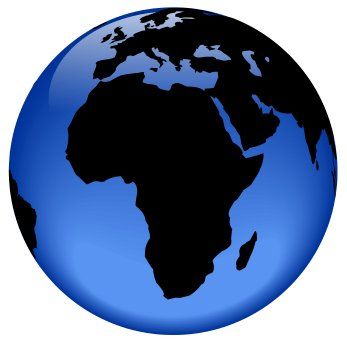Yemanja-Olokun – Umoja wa Maji (Oneness of Water) - Reiterated
- By kwende ukaidi
- •
- 01 Sep, 2023
- •
This is a reiteration of an article first published on 1st September 2021

The oneness of the sacred universe is beyond question in the Afrikan
worldview as the Supreme Being’s magnificently composed orchestration exudes
its eternal unanimity with superb expression. Elements within this great
and divine expanse epitomise that oneness. Vitally, water is such an
element. With the essential ingredient of abundant moisture of the heavens
stars and planets become manifest. As the earth emerges ocean water lavishly
beautifies its surface as the catalyst for life. Life giving and life
sustaining arteries of river flow run through the magnificent body of Afrikan
soil the largest of which becomes the Nile. Repositories of pools and lakes are
manifest as the grand regulators and incubators in the eternal continuum. The original
primeval water of Creation never ceases to be but circulates throughout the
world in cycles of everlasting flow millennia upon millennia into eternity.
Likewise, the Afrikan self becomes a microcosmic representation of primeval
water flow within the sacred universe. Of water, the abundantly blessed
original and divine masculine man and the original and divine feminine woman of
creation are eternal.
From the beginning water has held special sacred place in spirit life of the Afrikan. Represented by deities from the most ancient of times and throughout Afrika the reverence for the Creator Supreme’s water flow is crucial in the eternal life continuum. With ancient Nile Valley inheritance and natural organic flow in west Afrika heavenly water, fresh water and river flow became the preserve of their deities within that region. From region to region Afrikan souls have spiritual representation of water-flow because of its profound depth of importance to life. In west Afrika the deities of Olokun and Yemoja give energy to the divine feminine and divine masculine in respect of water-flow from river arteries to the deepest ocean depths. Even with the the recent centuries of Maafa disruption, these powerful deities are of living knowingness both on the continent of Afrika and throughout the Afrikan world (sometimes with variations in the expression of their names such as Yemanja).
In some areas, elevation of the female deity of Yemanja has taken precedence and certainly this has been true in the past in the arena of this author. However, Olukun ought never be neglected or denied his rightful and proper role and place of reverence in Afrikan life. To do so would surely be of spiritual imbalance (even disorder) that can then be reflected in Afrikan life with the spiritual aesthetic of Afrikan masculine manhood subjected to neglect. The results of this can be devastating, far reaching and wide in scope.
It is therefore considered important here for the Afrikan male deity of water to be naturally elevated to his greatest extent with all of his powerful qualities just as the Afrikan female deity of water is naturally elevated to the heights reflective of her wonderful qualities. In so doing the spiritual aesthetic is readily accessible to Afrikan men and women, as they empower themselves in their divine masculine manhood and their divine feminine womanhood (respectively).
Further, the oneness that water holds is a reflection of the spiritual conception of male-female union. It is well known in the Afrikan worldview that what exists in the physical is at best a reflection of what is metaphysical. Therefore, in celebrating Yemanja-Olokun, Afrikan manhood is brought to the fore, Afrikan womanhood is brought to the fore and the harmonious and complementary of the Afrikan male-female union can be rightfully energised, honoured, established, cultivated, nurtured, sustained and otherwise empowered generation to generation throughout each physical lifespan.
The observance of Yemanja-Olokun Siku is marked by the seventh day of ninth month (so-called September) with celebrations taking place on Sunday 7th or nearest Sunday to that date. This is a wonderful time of spiritual and cultural ascendancy in honour and celebration of this mighty water deity and her deep, profound and progressive meaning to Afrikan life. This is an important time in imperative mission for global Afrikan ascendancy. Yemanja Siku is a part of the Afrikan Cultural calendar of the Universal Royal Afrikan Nation (URAN).
The Universal Royal Afrikan Nation (URAN) is an Afrikan-centred spiritual and cultural mission for ascendancy that embodies living spiritually and culturally rooted life. To find out more about URAN and its spiritual-cultural mission for liberty and nationhood click here. The exquisite URAN pendant can be obtained online by clicking here.
In his capacity as an Afrikan-centred spiritual cultural practitioner this author is available for further learning in this regard and also for the carrying out of ceremonies such as naming and name reclamation. For details please click here.
Afrikan World Studies programmes are important forms of study in understanding the Afrikan experience. There are a range of subjects covered on these programmes including History, Creative Production, Psychology and Religion. To find out more about these learning programmes please click here. For the video promo for these learning programmes click here.
At nominal cost, also consider acquisition of an a4 laminate poster of articulations by this author when visiting the Yemanja-O establishment to enrol, consult, learn, gather or otherwise.
Also, visit www.u-ran.org for links to Afrikan liberation Love radio programme on Universal Royal Afrikan Radio online.
